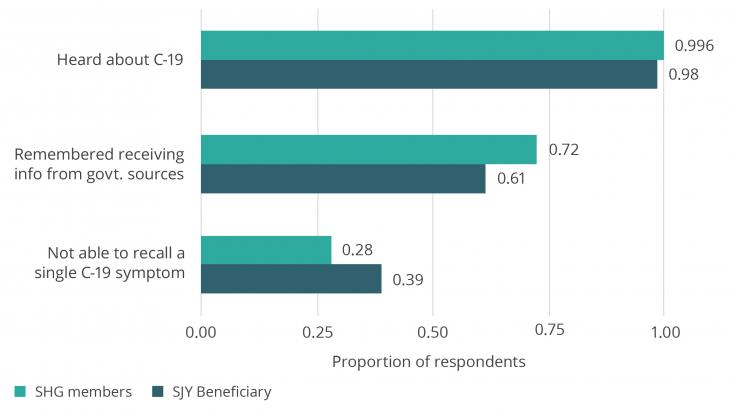The Graduation Approach during the Covid-19 Pandemic: Building Resilience among Ultra-poor Households in Bihar
Project Summary
Location: Bihar (districts of Patna, Nalanda, Lakhisarai, Khagaria, Samastipur)
Sample: 1,010 ultra-poor women and self-help group (SHG) members
Timeline: May - August 2020
J-PAL Initiatives providing funding: N/A
Target group: Rural population (ultra-poor women under the Satat Jeevikoparjan Yojana (SJY) program) and SHG members in Bihar)
Outcome of interest: Health knowledge and awareness; Access to social protection schemes; Food security and nutrition
Covid-19 dimensions: Economic shocks on individuals, households, and small and medium enterprises (SMEs); Knowledge, attitudes, practices & beliefs; Access to government relief measures; Cash transfers; Food security
Mode of data collection: Computer-assisted Telephone Interviewing (CATI) / phone surveys
Nature of activities: Data collection (surveys)
Research paper(s): N/A
Project Details
The “Graduation Approach” is a multifaceted livelihoods program that has been implemented in countries across the world by providing ultra-poor and women-headed households with a productive asset, training, mentoring, access to savings, and consumption support to help them graduate from extreme poverty. In 2018, the program was scaled up to 100,000 ultra-poor households in Bihar by the Bihar Rural Livelihoods Promotion Society (BRLPS), also known as JEEViKA, through the Satat Jeevikoparjan Yojana (SJY), a livelihoods scheme targeting ultra-poor women.
Following the onset of the Covid-19 crisis and recognizing the likelihood of diminished income and the associated risk of food insecurity among ultra-poor households, JEEViKA deployed the existing SJY architecture to extend cash support of INR 2000 to beneficiaries of the SJY program.
This descriptive study builds on telephonic surveys in which researchers assessed the economic shock of the nationwide lockdown, health knowledge and access to social protection schemes among poor women in Bihar:
- The first round (June-July 2020) was conducted with women who were SJY beneficiaries and a comparable group of women who were a part of JEEViKA’s network of self-help groups.
- A follow-up round (August 2020) was then conducted with SJY beneficiaries who had launched their own enterprises under the scheme.
Given that the surveys found that many SJY beneficiaries and SHG members could not recall Covid-19 symptoms and reported cutting down the size of their meals to tide them through the lockdown, raising Covid-19 awareness among ultra-poor women in Bihar and connecting them to existing social protection schemes remains important.
While the lockdown affected the women’s ability to run and develop their enterprises, they had access to a source of income even as other sources such as casual labour broke away. Researchers found that the Graduation Approach is an important pathway for economic inclusion amid the Covid-19 crisis: investing in the Graduation Approach in Bihar before the pandemic enabled the government to quickly extend financial and mentoring support to ultra-poor households once the crisis began.
Research Results
Raising Covid-19 awareness: While almost all households, both SJY beneficiaries and SHGs, reported that they had heard about Covid-19 (98.1 percent and 99.6 percent respectively), 39 percent of women under SJY and 28 percent of SHG members were unable to recall even one symptom of the disease (Figure 1). JEEViKA has since ‘mainstreamed’ raising Covid-19 awareness into the daily work of frontline workers.

Connecting households to existing social protection schemes to ensure food security:
- In the first survey round (June-July 2020), more than half of all respondents reduced the number/size of meals for some household members (66 percent of SJY households and 53 of SHG households) since the lockdown began. JEEViKA has since fast-tracked the enrollment of SJY beneficiaries into the Public Distribution System, India’s nationwide food security scheme.
- In the second survey round (August 2020), all SJY beneficiaries in the study had an Aadhar card in their name (a biometrically linked identity card that allows holders to apply for social assistance) and 78 percent possessed a government-provided ration card.
- In terms of the short-term social protection schemes announced by the government due to Covid-19, 80 percent of respondents in the follow-up survey (SJY beneficiaries with enterprises) had accessed one month of free rations, 45 percent had received INR 500 in their accounts opened under a national financial inclusion scheme, 38 percent received free cooking gas cylinders, and 28 percent received INR 1000 announced for ration card holders.
While the lockdown affected SJY beneficiaries’ ability to run their microenterprises, many still had a source of income when other income sources dwindled: In August 2020, over half (53 percent) of SJY beneficiaries reported that they were able to run their microenterprises continuously since national lockdown had been announced. This implies that many SJY beneficiaries had access to a source of income even as other income opportunities, such as casual labor, disappeared. Only 28 percent of respondents reported that they had run their businesses “for some of the time” and less than one-fifth (18 percent) didn’t run them at all since the national lockdown was announced. For eight out of ten households that were running their microenterprises at the time of the survey, monthly sales in the previous 30 days were lower than the average monthly sales prior to the lockdown, a factor that may limit future enterprise development.